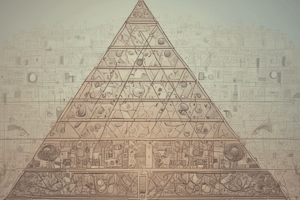Podcast
Questions and Answers
What is Boolean algebra?
What is Boolean algebra?
- A set of rules for numerical operations
- A mathematical structure dealing with real numbers
- A set of rules and operations for working with variables whose values are either 0 or 1 (correct)
- A programming language for logic circuits
What value does 0 correspond to in propositional logic?
What value does 0 correspond to in propositional logic?
F
What value does 1 correspond to in propositional logic?
What value does 1 correspond to in propositional logic?
T
What does Boolean multiplication represent?
What does Boolean multiplication represent?
What operation does Boolean addition represent?
What operation does Boolean addition represent?
What does the complement of an element do?
What does the complement of an element do?
What are Boolean variables?
What are Boolean variables?
What are Boolean expressions formed from?
What are Boolean expressions formed from?
What does it mean for two Boolean expressions to be equivalent?
What does it mean for two Boolean expressions to be equivalent?
Which of the following represents the Idempotent law in Boolean algebra?
Which of the following represents the Idempotent law in Boolean algebra?
What is the Associative law in Boolean algebra?
What is the Associative law in Boolean algebra?
What does the Distributive law state?
What does the Distributive law state?
What does the Double complement law state?
What does the Double complement law state?
What are De Morgan's laws?
What are De Morgan's laws?
What is a Boolean function?
What is a Boolean function?
What does an input/output table represent?
What does an input/output table represent?
What is a literal?
What is a literal?
What is a minterm in Boolean functions?
What is a minterm in Boolean functions?
What is disjunctive normal form (DNF)?
What is disjunctive normal form (DNF)?
What is conjunctive normal form (CNF)?
What is conjunctive normal form (CNF)?
Flashcards are hidden until you start studying
Study Notes
Boolean Algebra Overview
- Boolean algebra comprises rules and operations for manipulating variables that hold binary values: 0 and 1.
- Boolean variables only take on values of 0 or 1.
Values in Boolean Algebra
- The value 0 represents false (F) in propositional logic.
- The value 1 represents true (T) in propositional logic.
Boolean Operations
- Boolean Multiplication (AND): Denoted by a dot or adjacency; behaves like standard multiplication but results correspond to the logical AND operation.
- Boolean Addition (OR): Denoted by a plus sign (+); follows standard addition rules with the exception that 1 + 1 results in 1, corresponding to logical OR.
Complement and Variables
- The complement of an element reverses its value, denoted with a bar or apostrophe (x’), similar to the logical NOT operation.
- Boolean expressions combine Boolean variables and constants (0 and 1) using established operations with a specific order of precedence.
Equivalence and Properties
- Two Boolean expressions are equivalent if they yield identical outcomes across all variable combinations, denoted by the equal sign (=).
- Idempotent Laws: x + x = x and x * x = x.
- Associative Laws: (x + y) + z = x + (y + z) and (xy)z = x(yz).
- Commutative Laws: x + y = y + x and xy = yx.
- Distributive Laws: x + yz = (x + y)(x + z) and x(y + z) = xy + xz.
Identity, Domination, and Complement Laws
- Identity Laws: x + 0 = x and x * 1 = x.
- Domination Laws: x * 0 = 0 and x + 1 = 1.
- Double Complement Law: The double complement of x yields x.
- Complement Laws: x * x' = 0 and x + x' = 1.
De Morgan's Laws
- (x + y)’ = x’ * y’ and (xy)’ = x’ + y’.
Absorption Laws
- x + (xy) = x and x(x + y) = x.
Boolean Functions
- A Boolean function maps input values (from {0, 1}) to outputs in the same set.
- Represented using input/output tables or Boolean expressions; for example, f(x, y, z) = xy + yz.
Additional Concepts
- Input/Output Table: A truth table showing output values for each combination of inputs, typically started with 0s.
- Literal: A Boolean variable or its complement.
- Minterm: A specific product of literals resulting in unique combinations of variables.
- Disjunctive Normal Form (DNF): A sum of products format for Boolean expressions (e.g., x'yz' + xy + w' + yz'w).
- Conjunctive Normal Form (CNF): A product of sums format for Boolean expressions.
Studying That Suits You
Use AI to generate personalized quizzes and flashcards to suit your learning preferences.




